“The trouble with these international affairs is they attract foreigners.”— Robert Morley
Of the many changes that occurred in the 1960s, clearly one was witnessing the last films of many of the great directors of Hollywood’s so-called “Golden Age”—not only “so-called,” it was—men such as John Ford, Frank Capra, Michael Curtiz, Howard Hawks and King Vidor. A second change, at least temporarily until the coming of SFX, was the demise of the expensive epic—those biblical, historical and musical extravaganzas—best illustrated in the infamous disaster Cleopatra (1963), which bankrupted 20th Century-Fox.
The epic endured to a lesser degree, only now the exceptional length, extravagance and large international casts were devoted to comedy—and it helped if everything was ridiculous, as this new breed of film often was. Their immediate origin can be traced to Around the World in 80 Days, a novelty in 1956, with its now-you-see-them-now-you-don’t cameos of big-named stars, popping up here and there, often for a single scene, more a distraction than a plot asset.
The premise of 80 Days is, will Phileas Fogg (David Niven) win a race against time and win a bet. In It’s a Mad, Mad, Mad, Mad World (1963), it’s a race to be sure, only now by a disparate group of more than twenty people to find $350,000, people who share one thing in common—greed.
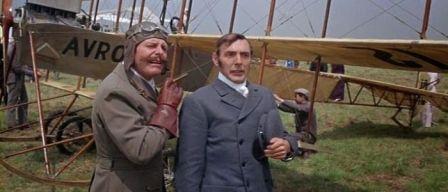 The Great Race (1965), a 1920s automobile race between New York and Paris, stars Tony Curtis, who also appears in Those Daring Young Men in Their Jaunty Jalopies (1969), in a similar race and time. Jaunty Jalopies, with the same director (Ken Annakin), composer and featuring some of the same stars, was a less impressive clone of what had come before, the masterpiece of its type, Those Magnificent Men in Their Flying Machines (1965). Only now the racing automobiles have become airplanes, either vintage aircraft or accurate replicas of the period.
The Great Race (1965), a 1920s automobile race between New York and Paris, stars Tony Curtis, who also appears in Those Daring Young Men in Their Jaunty Jalopies (1969), in a similar race and time. Jaunty Jalopies, with the same director (Ken Annakin), composer and featuring some of the same stars, was a less impressive clone of what had come before, the masterpiece of its type, Those Magnificent Men in Their Flying Machines (1965). Only now the racing automobiles have become airplanes, either vintage aircraft or accurate replicas of the period.
In keeping with the international competition in Those Magnificent Men in Their Flying Machines—a 1920s race from London to Paris (the crossing of the English Channel is a chance for hilarious aerobatics, indeed)—the cast is international, though with a predominance of British luminaries. It was, after all, directed, produced and musically scored by Britons.
The main stars are American and British—Stuart Whitman as the brash, young man after the heart of Sara Miles, an ardent suffragette and amateur aviatrix, who has already in place a suitor, aviator James Fox, and Whitman’s automatic rival.
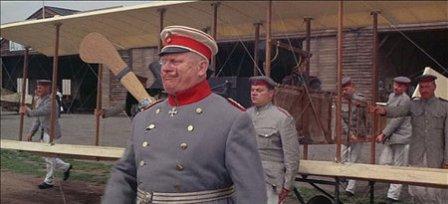 Miles’ father (Robert Morley), once against the race, is persuaded to sponsor an international London-to-Paris airplane competition to promote British aviation. The contestants reflect the cliché caricatures of the different nationalities. A sure recipient of a large portion of the laughs is Gert Fröbe, the by-the-book Prussian military oaf, who, having never flown a plane, consults an instruction manual as he takes off.
Miles’ father (Robert Morley), once against the race, is persuaded to sponsor an international London-to-Paris airplane competition to promote British aviation. The contestants reflect the cliché caricatures of the different nationalities. A sure recipient of a large portion of the laughs is Gert Fröbe, the by-the-book Prussian military oaf, who, having never flown a plane, consults an instruction manual as he takes off.
Alberto Sordi is the hot-blooded Italian count; Jean-Pierre Cassel, the romantic Frenchman ready and willing to chase any skirt in sight, Yujiro Ishihara the late-to-show Japanese naval officer and Terry-Thomas, the conniving Brit who is out to sabotage everyone.
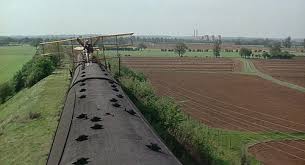 Although few of the starters will place or even finish the race due to numerous crashes, along the way wild, improbable shenanigans abound. In a pre-race air balloon duel between Fröbe and the Frenchman, the Prussian does himself in when his spiked helmet punctures his balloon’s underside.
Although few of the starters will place or even finish the race due to numerous crashes, along the way wild, improbable shenanigans abound. In a pre-race air balloon duel between Fröbe and the Frenchman, the Prussian does himself in when his spiked helmet punctures his balloon’s underside.
When the Italian’s plane lands in the courtyard of a nunnery and he bemoans that now the race will be won by a Protestant, the mother superior (Flora Robson) cries, “Sisters, don’t stand there gazing, this good Catholic needs our help!”
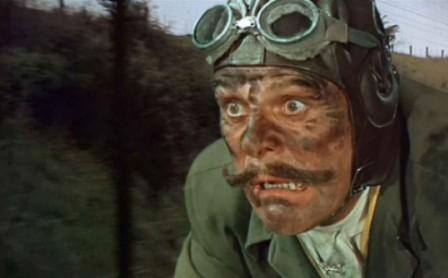 Terry-Thomas meets his deserved end when his vision is impaired by smoke from a train engine and is forced to land on the top of a passenger car. Worse, his plane is quickly crushed in an approaching tunnel.
Terry-Thomas meets his deserved end when his vision is impaired by smoke from a train engine and is forced to land on the top of a passenger car. Worse, his plane is quickly crushed in an approaching tunnel.
Although Fox wins the race because Whitman heroically stopped to assist Sordi and lost time, the British aviator insists that the American share the wining trophy with him. He doesn’t get Miles, however, who picks Whitman as her love.
In the final scene, her and Whitman’s kiss is interrupted by a noise. Above them is a flyover of six modern jet fighters—British, of course—as the time catapults to the then present, 1965.
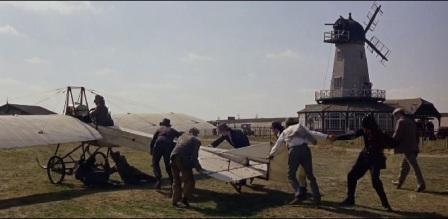
If the outrageous slapstick and broad humor on screen isn’t enough—there’s even a tribute to the Keystone Cops as fire engines run amuck on the landing field—there is a comical prologue. Red Skelton, in his last theatrical movie as a Neanderthal test pilot, interacts with silent film clips in a brief history of aviation with all the attendant mishaps. It is narrated by James Robertson Justice.
Then there’s the totally appropriate score of Ron Goodwin, mimicking every catastrophe with flair and humor. The main and end title credits feature Goodwin’s own catchy lyrics:
Those magnificent men in their flying machines,
They go up-tiddly up up,
They go down-tiddy down down.
They enchant all the ladies and steal all the scenes,
With their up-tiddy up up
And their down-tiddy down down.Up, down, flying around,
Looping the loop and defying the ground.
They’re all frightfully keen,
Those magnificent men in their flying machines.
[embedyt] https://www.youtube.com/watch?v=TO7-_fGqGTg[/embedyt]
